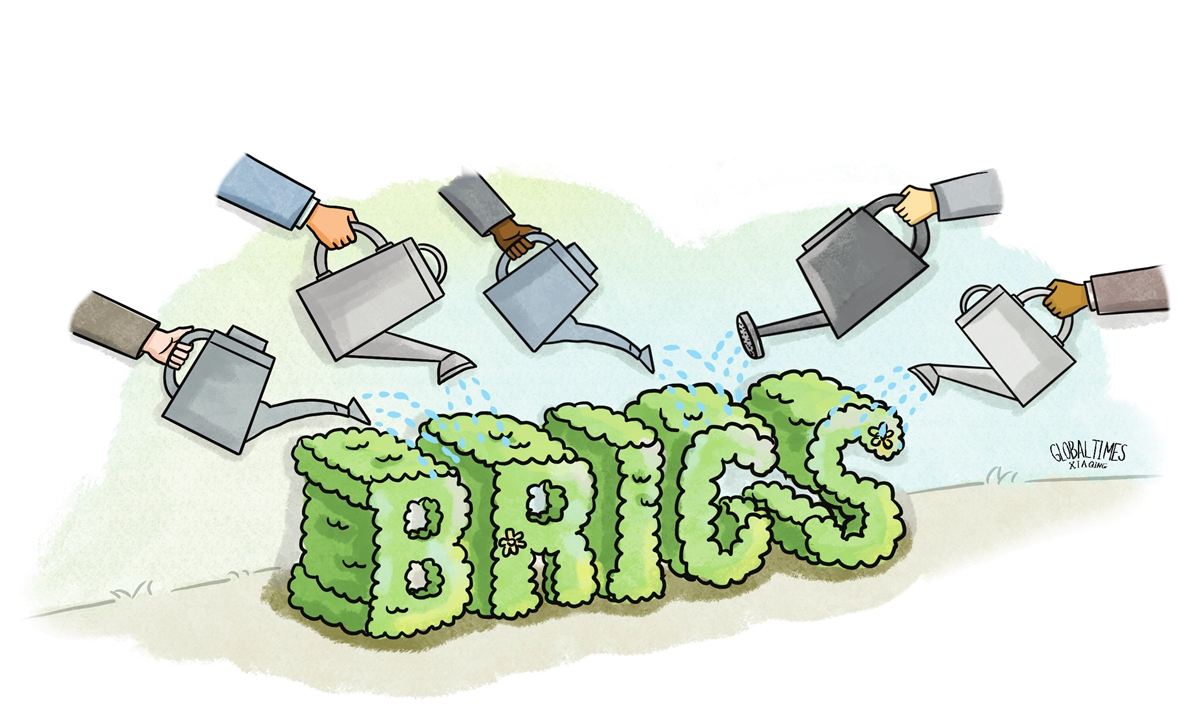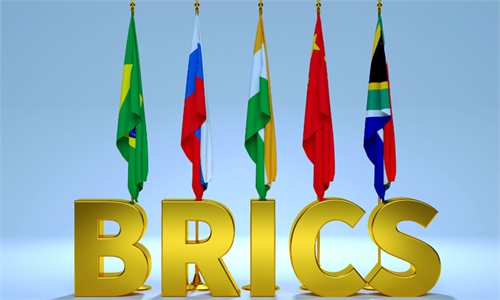
Illustration: Xia Qing/Global Times
A powerful group of emerging-market economies is building a new world order. The BRICS group of nations has overtaken the G7's global GDP contributions this year. Formed in 2009, BRICS, which comprises Brazil, Russia, India, China and South Africa, now accounts for nearly one-third of the world's economic activity. As it continues to grow in strength, shaping both the global economy and geopolitical landscape, African countries have shown great enthusiasm to join the BRICS group of nations, with its annual summit coming to Africa next month.
BRICS is emerging as the central pillar of the global economy and has already flouted the possibility of having its own global reserve currency. Such a move would end the strong reign that the US dollar has had for nearly half a century. Conversations of a common currency will be at the heart of discussions during the 15th BRICS Summit this year at Sandton Convention Centre, Johannesburg, August 22 to 24. Additionally, discussions around new members for greater geopolitical consolidation of the BRICS grouping are expected to continue at length. BRICS is a symbol of renewed hope toward achieving Africa's development agenda and prosperity.
The group has taken on the unique role of building a community of like-minded development partners from the South to promote common development by advancing the interests of developing countries and boosting economic recoveries.
In line with the Summit's theme, "BRICS and Africa: Partnership for Mutually Accelerated Growth, Sustainable Development and Inclusive Multilateralism," the focus is squarely on African development. This aligns with China's goal that no country or individual should be left behind in pursuit of sustainable development. This is a goal that continues to inform China-Africa relations and propel development across the African continent.
By pitching this particular theme, South Africa is using its role as chair to build and leverage China's focus on Africa, centered on an economic growth agenda that improves livelihoods. In tandem, African countries are looking upon the meeting as an opportunity to change course and strengthen ties with BRICS as economies in the West stagnate.
The list of African countries which have expressed an interest in joining BRICS is indicative of a continent that is ready to enter the new economic order. These countries are drawn from all corners of the continent and they include Egypt, Ethiopia, Sudan, Nigeria, Tunisia, Zimbabwe, Senegal and Algeria. A number of African countries such as South Africa, which is already in the BRICS club, Nigeria and Egypt who have expressed an interest to join, are recognized as emerging economies in their own right by many international organizations. Ethiopia's key role in founding the African Union and expressing an interest in joining BRICS is indicative of its deteriorating relations with the West, a narrative that is developing in a growing number of African countries.
As China and Africa strengthen their relations, showing developing nations that it is possible and sustainable to have mutually beneficial cooperation between developing countries, there is an appetite in Africa for partnerships of equality. The long-term stable China-Africa relationship continues to bear fruit for Africa, for it is China that first floated the idea of expanding BRICS to include more member countries when it chaired the BRICS group in 2022.
Since then, more than 40 countries have expressed the desire to become a member including those in the Middle East, Latin America and Africa. South Africa's representative to BRICS has confirmed that the number is set to increase. For African countries, BRICS is no longer an alternative model to the G7 Western economic model, but the economic representation of the dreams and aspirations of an ambitious Africa. Through BRICS, African countries seek to move from the periphery to the epicenter of decision-making and chart a viable development path for their people.
With the expansion, BRICS will become a bigger and better economic space for the Global South community. It is therefore an economic model that prioritizes a win-win cooperation, delivering benefits for all involved, just like China-Africa relations.
China has held strong the position of Africa's largest trading partner for 14 consecutive years. During this period the continent has recorded exponential growth and development. What makes BRICS an attractive development model for developing countries in Africa are the same reasons that have made China a much-valued development partner: A non-interference policy in the sovereign affairs of its development partners is a particularly important aspect of the profile of the development partner that Africa is keen to align with.
The author is a Kenya-based journalist. opinion@globaltimes.com.cn

